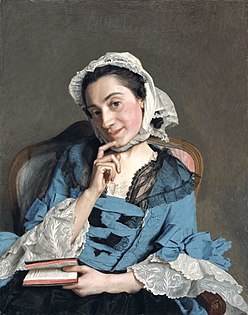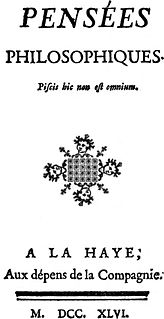Jeanne-Catherine de Maux (1725-?), better known as Mme de Maux (Madame de Maux), was a natural daughter of Quinault-Dufresne. In 1737, aged twelve, she married a lawyer in Paris. She later became a lover of Denis Diderot's friend Damilaville. Some time after Damilaville's death, in 1768, she became the lover of Diderot, but later left him for a younger man. [note 1] She is considered significant because many letters written by Diderot to her, containing scientific, philosophical, and romantic content, have survived. Diderot began writing Sur les femmes soon after his romantic relationship with Mme de Maux had ended. [2] [3] [4] It has been stated that his romantic dalliance with Mme de Maux resulted in Diderot producing some of his best writings on love, sex, and sexuality. [5]

Abraham-Alexis Quinault, called Quinault-Dufresne,(9 September 1693 in Verdun – 12 February 1767 in Paris) was a French actor. He was a member of the Quinault family of actors.

Denis Diderot was a French philosopher, art critic, and writer, best known for serving as co-founder, chief editor, and contributor to the Encyclopédie along with Jean le Rond d'Alembert. He was a prominent figure during the Enlightenment.

Étienne Noël Damilaville 21 November 1723 – 13 December 1768) was an 18th-century French man of letters, friend of Voltaire, Diderot and d'Alembert. He served in various military and administrative functions of the Ancien Régime. He was a member of the bodyguard of King Louis XV, and then a senior civil servant in the tax office responsible for supervising the Vingtième. His official roles meant that his correspondence was unexamined by censors, enabling him to circulate letters between leading thinkers of the day, most particularly during the Sirven affair.
Mme de Maux is known to have been a friend of Mme d'Épinay. [6]

Louise Florence Pétronille Tardieu d'Esclavelles d'Épinay, better known as Mme. d'Épinay, was a French writer, a saloniste and woman of fashion, known on account of her liaisons with Friedrich Melchior, Baron von Grimm, and Jean-Jacques Rousseau, who gives unflattering reports of her in his Confessions, as well as her acquaintanceship with Denis Diderot, Jean le Rond d'Alembert, Baron d'Holbach and other French men of letters during the Enlightenment. She was also one of many women referenced in Simone de Beauvoir's The Second Sex as an example of noble expansion of women's rights during the 18th century.






